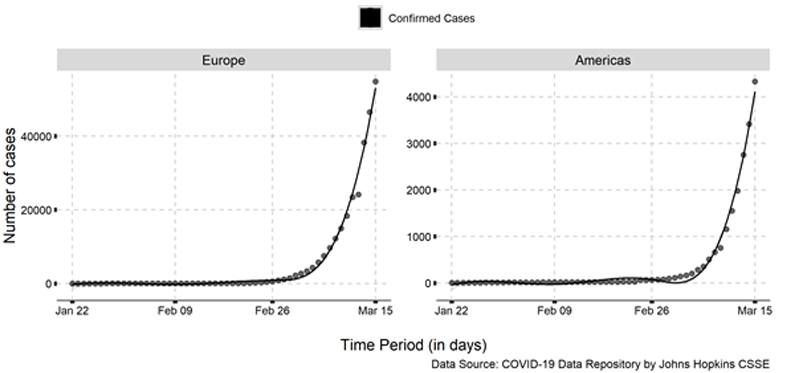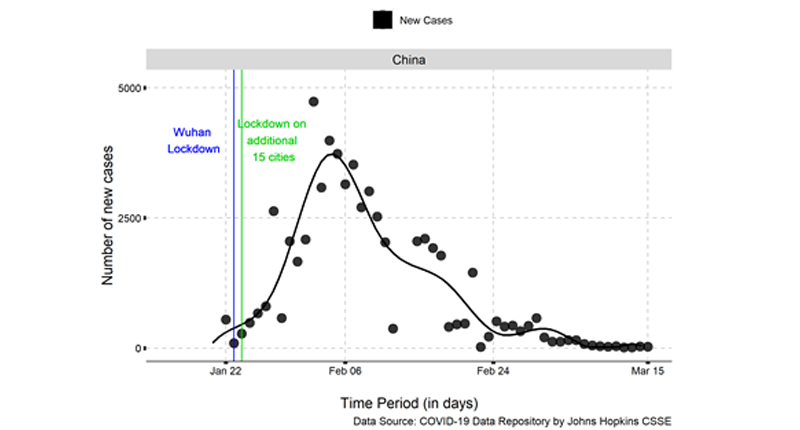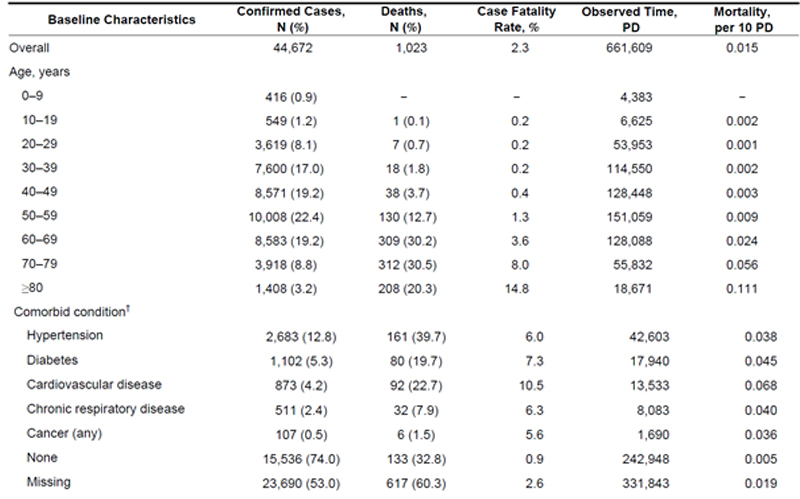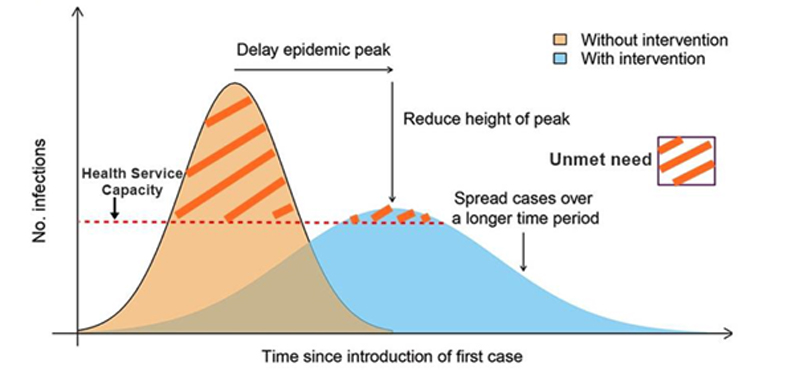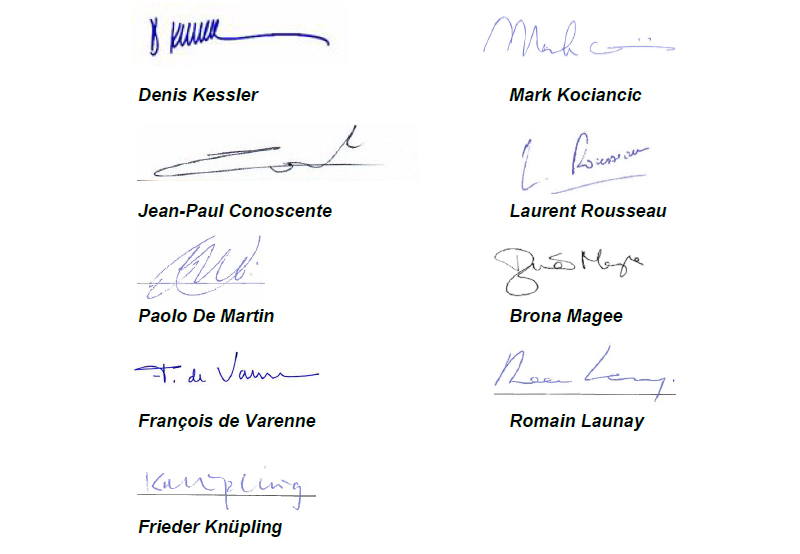COVID-19 – A call for action
SCOR’s Executive Committee calls upon organisations and individuals to take immediate action to slow down the spread of COVID-19.
March 19, 2020

Dear friends and trusted partners,
On March 11, the World Health Organisation declared the outbreak of COVID-19 a “global pandemic”. These are alarming words. Like many of you in this industry, we have looked at many models of pandemics over the years. It feels very surreal to find ourselves in the middle of one.
In this situation, as in any crisis, it can be hard for people to know what to do and what to expect. Flooded with information and different opinions, we wonder if we are being too alarmist or perhaps not alarmist enough. Not entirely sure of what to do, many often adopt a wait and see approach. The problem, however, is that this virus is spreading exponentially and in order to slow down the spread, we all need to take immediate action today, both as organisations and as individuals.
We in the (re)insurance industry have a leadership role to play now.
Few other industries have the mathematical expertise to understand the potential impact that COVID-19 can have. And for life (re)insurance in particular, no other industry has such an alignment with the health and well-being of our society. We need to spread our knowledge and educate our fellow citizens of the world to protect all of society, particularly our elderly, our ill and our health-care professionals.
We are not writing this letter because of the financial impact this virus could have on our life reinsurance book. At the present time, based on current public and client information available, and with all required caveats and subject to the evolution of the pandemic across the globe and the effectiveness of containment measures put into place by the respective public authorities, SCOR does not foresee material impact on its book from COVID-19. SCOR will continue to regularly assess the COVID-19 impact on its business. With the information that is known at present, we are in a situation that has strictly nothing to do with the 1/200-year extreme stress scenario disclosed by SCOR. We are writing this letter because we care. We care about you, your employees and their families, we care about our employees and their families, we care about our society, and about our health care systems. And from the conversations we at SCOR have had with you over the last years, we know you care too. We have had long discussions with you about how the insurance and reinsurance industry can create more impact. There will never be a more important time to make an impact than there is today.
So, what do we know and what action can we take? We have decided to share with you our knowledge and our questions.
WHAT DO WE KNOW?
We are all still learning about this virus and we have focused all our efforts on understanding as much as we can over the past weeks. Some facts are becoming clear, other information is more blurry, and there is still plenty that is completely unknown. Here is what we can say at this stage:
COVID-19 spreads exponentially
Looking at the confirmed infection rates we are seeing, it is obvious that this virus is spreading exponentially. On January 24, there were 16 cases of COVID-19 confirmed outside China. On March 17, we saw 197,098 confirmed cases in 143 countries.
These numbers are going to rise. Looking at the figure 1 below, we see that the virus is following the same path in all Western countries. Every person that becomes infected is infecting two to three others on average. For every person diagnosed, many more are carrying the virus without realising it and are also infecting others. Before the symptoms appear, infected people are contagious for 2 to 3 days. It is also estimated that infected people, for a very large proportion of them, exhibit no or mild symptoms. Within the confirmed COVID 19 cases, this proportion is around 75-80%. Therefore, those people become the perfect “transporters” for the virus as they move around freely.
The number of confirmed COVID-19 cases starts off gradually and then rapidly escalates to an explosion point. As we are seeing today in Italy, this will cause huge problems for healthcare systems that have never experienced these numbers of people getting seriously sick at the same time.
Figure 1 – COVID-19: Cumulative cases between January 22 and March 15, 2020
Containment measures work
When we look at the same graph for Asian countries, we can observe the impact that containment measures have had. Looking at the figure 2 below, we see that China has now been successful in controlling the spread of the virus. Strict quarantine rules and strong responses in Singapore and Hong Kong have also been highly effective in reducing the spread of the virus in these countries.
Containment measures in these countries have been dramatic – with social interactions between people massively reduced. It has been very hard for citizens in these countries, but we can see the impact it has had. Drastic measures do work!
Figure 2 – COVID-19: Daily new cases in China between January 22 and March 2015, 2020
This virus particularly affects the vulnerable
This virus particularly impacts the vulnerable members of our society. Looking at what we observe in China, Lombardy in Italy and South Korea, it is evident that case fatality rates are very dependent on age. We see much higher mortality rates observed for 70-year-olds plus, especially for those with health conditions that weaken the lungs and immune system.
Table 1 – Patients, deaths, and case fatality rates, as well as observed time and mortality for n= 44,672 confirmed COVID-19 cases in Mainland China as of February 11, 2020
Data source: CDC study “The epidemiological characteristics of an outbreak of 2019 Novel Coronavirus Diseases (COVID -19) – China, 2020”. All COVID-19 cases reported through February 11, 2020 were extracted from China’s Infectious Disease Information System. Analyses included the following: 1) summary of patient characteristics; 2) examination of age distributions and sex ratios; 3) calculation of case fatality and mortality rates; 4) geo-temporal analysis of viral spread; 5) epidemiological curve construction; and 6) subgroup analysis.
These are our parents, our brothers and sisters, our friends, our neighbours. These are the people who gave us what we have today. We owe it to them to fight this virus on their behalf.
The more pressure on the healthcare systems the worse the fatality rates
Case fatality rates (CFR) in the Hubei province in China (4.5%) are much higher than for the rest of China (0.9%). The CFR in Italy (6.7%) is much higher than what we currently see globally (3.4%). We clearly see that when healthcare systems can no longer cope with the number of cases, outcomes significantly deteriorate.
If we look at official statistics of people that are currently confirmed infected in Italy (26,000 cases), we see that a significant amount of people (roughly 50% i.e. ~13,000) are currently hospitalized with serious respiratory problems and 8% (~2,100) are currently in intensive care. Our healthcare systems were not designed to cope with these situations. Hospitals cannot quickly gear up to treat large numbers of such patients in critical condition.
We need to take action now
For this reason, we all need to take action today. Serious action. The measures we take today won’t stop the virus spreading – it is too late for that. But they will determine whether we can slow it down so that our healthcare systems can cope. As shown in the figure 3 below, if we can spread the cases over a longer time period, we massively improve the situation.
Figure 3 – Intended impact of enhanced hygiene and social distancing measures on the COVID-19 pandemic
Data source: CDC study “Nonpharmaceutical Measures for Pandemic Influenza in Nonhealthcare Settings—Social Distancing Measures”, Volume 26, Number 5—May 2020
WHAT ACTION CAN WE IN THE INSURANCE INDUSTRY TAKE?
It will be months before the pharmaceutical industry can develop and produce an effective vaccine or drugs to help fight this virus. There are only two ways we know today to slow down the spread – enhanced hygiene, particularly hand washing, and limiting social interaction.
We are seeing many different reactions to the virus in Western countries today. Many people still do not appreciate the seriousness of this situation and continue to live their lives with little or only moderate adjustment to their daily routines. Most people are not medical professionals, actuaries or statisticians, so it can be hard for them to understand why any action is necessary as case numbers build gradually. That is why those of us in the insurance industry have such an important role to play in helping our fellow citizens understand about the spread of the virus and what actions can slow that spread down.
SCOR took a series of strong measures to fight the virus
At SCOR, we changed our global working arrangements and asked our staff to work from home as soon as we had first signals of increasing expansion, even before certain governmental confinement measures were implemented. We are doing everything we can to stop our employees from becoming infected and contributing to the spread.
Thanks to technology, we are spending time connected with our people, talking to them by video and phone, educating them, doing everything we can to ensure that they understand the seriousness of the situation. We implore them to behave responsibly in their personal lives, seriously limiting the interactions they have with others. We are reminding them of the importance of good hygiene. And we are asking them to spread information on the gravity of this situation to their friends, families and relatives.
Spreading the message, not the virus
There is more to be done and we are fortunate to be in a position of influence. We have seen action from governments and business leaders to various extents across countries. We are calling on everyone in this industry to spread information on the seriousness of this situation and maximise the actions they are taking, for the good of our entire society.
Thinking ahead and anticipating the new normal
As we fight today’s war against the virus, we at SCOR are also thinking of tomorrow: one day, the pandemic will be over, but beyond the sanitary, economic and financial impact, this crisis has a structural impact. Things have changed: we will not return to the life we knew. We need to acknowledge that what looks like a disruption today, might actually become the new normal. There might well be a shift of paradigm, questioning the relevance of insurance, and reinsurance, to best address society’s needs. What seemed an extreme scenario yesterday might in fact be part of this new normal.
Being able to learn from our experience will enable us to build a better world.
We will periodically update you. And please do not hesitate to contact us, and to give us your analysis and feedbacks.
Wishing you, your families and loved ones, as well as your employees, good health during this difficult time.
The Executive Committee of SCOR
